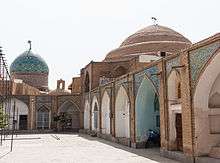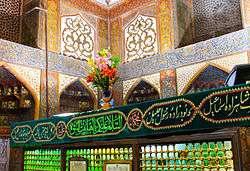Emamzadeh Esmaeil and Isaiah mausoleum
| Emamzadeh Esmaeil and Isaiah mausoleum | |
|---|---|
 | |
| Basic information | |
| Location | Isfahan, Iran |
| Geographic coordinates | 32°39′47″N 51°41′09″E / 32.663186°N 51.685767°ECoordinates: 32°39′47″N 51°41′09″E / 32.663186°N 51.685767°E |
| Affiliation | Shia Islam |
| Province | Isfahan |
| Municipality | Isfahan |
| Architectural description | |
| Architectural type | Imamzadeh |
| Dome(s) | 1 |



Emamzadeh Esmaeil and Isaiah mausoleum(Persian: امامزاده اسماعیل و مسجد شعیا) is a historical complex in Isfahan, Iran, which dates back to the Seljuk and Safavid era. This complex is located near the Jameh Mosque of Isfahan, in the Hatef street and contains two mausoleums, one believed to be for Esmaeil, one of grandsons of Hasan ibn Ali, and another which is believed to be Isaiah's.
The eldest part of this complex is Saiah mosque (the place which is believed to be Isaiah's tomb) and remnants of a seljukid minaret. Nastaliq inscription on the northern wall says, that this mosque dates back to Imam Ali's era, but according to archeological researches no parts of it is older than Seljuk era. This mosque has been completely rebuilt and repaired in the Safavid era. The tiling of marble mihrab in its Shabestan is one of the parts, which belongs to the Safavid age. Its tomb, portico and yard date back to Safavid time and there are some relics in them from the famous kings like Abbas I, Safi and Sultan Husayn. The portal of Emamzadeh Esmaeil's yard is under an interesting dome from the Turkmen age. There are two gravestones in the Imamzadeh. One of the gravestones belongs to the daughter of the last Safavid king Ismail III and another one belongs to one of Islamic scholars, Hadi Mirlohi.[1][2]
See also
| Wikimedia Commons has media related to Category:Emamzadeh Esmaeil and tomb of Isaiah. |
References
- ↑ Hosseyn Yaghoubi (2004). Arash Beheshti, ed. Rāhnamā ye Safar be Ostān e Esfāhān(Travel Guide for the Province Isfahan) (in Persian). Rouzane. p. 116. ISBN 964-334-218-2.
- ↑ Isfahan portal